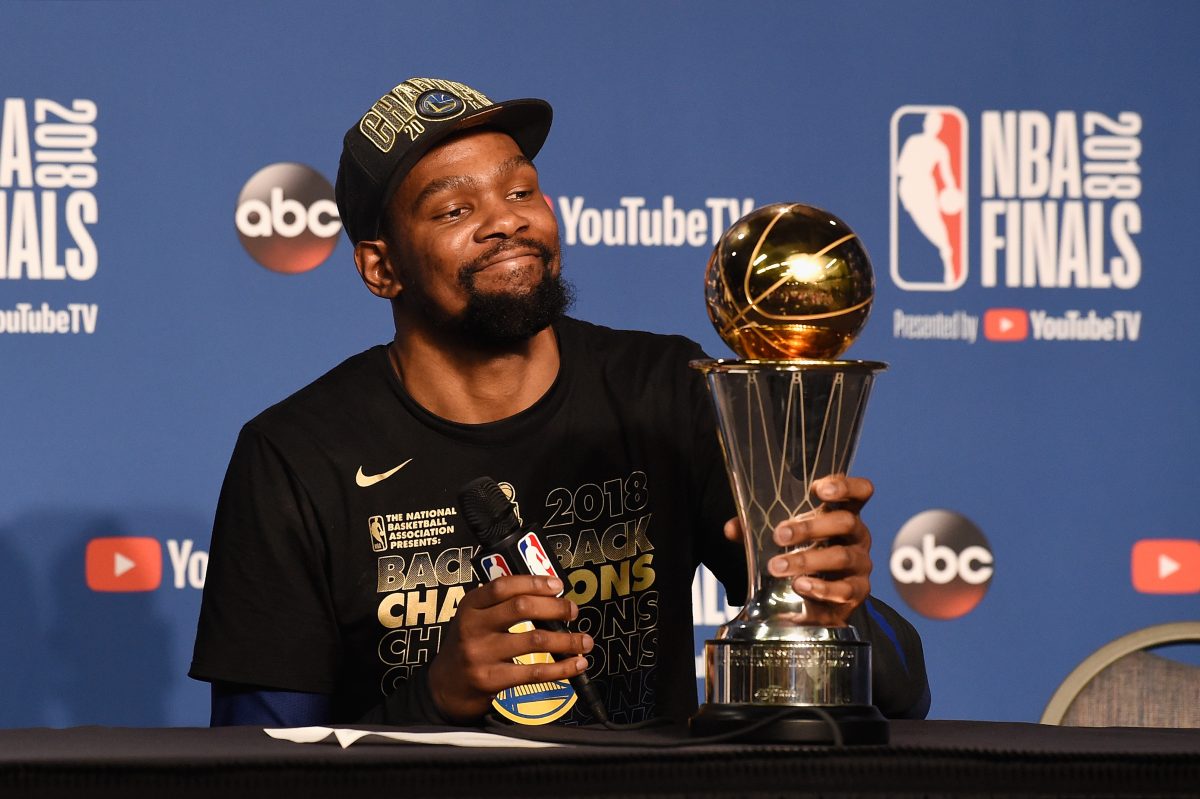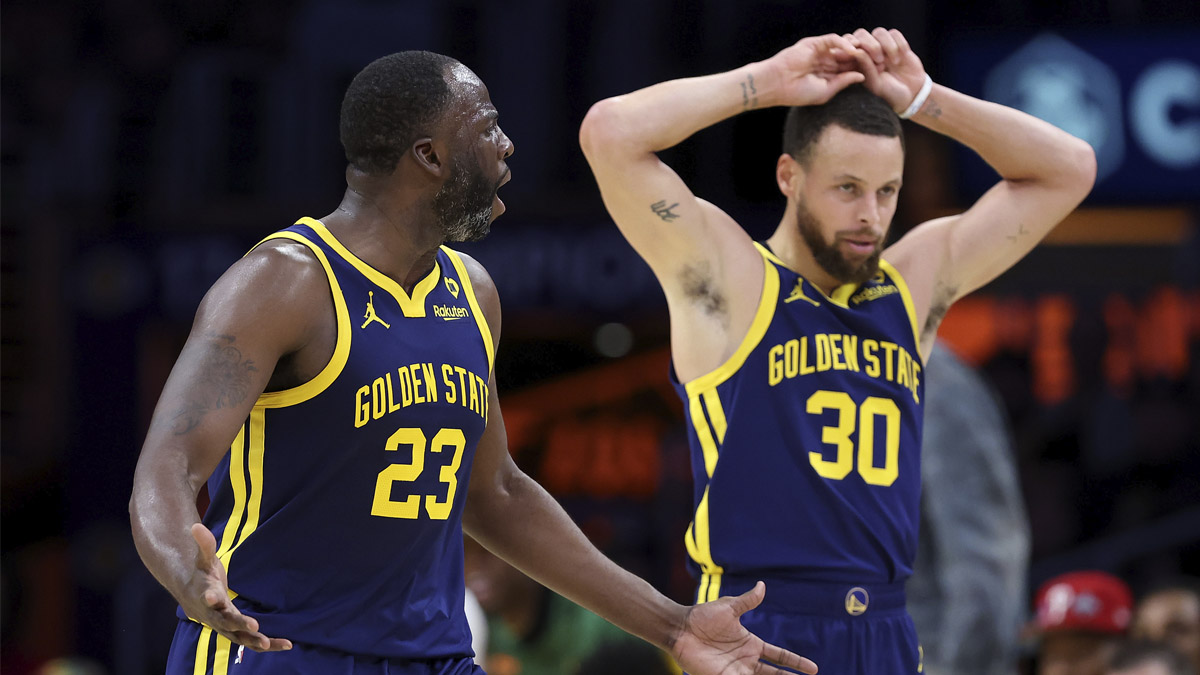SAN FRANCISCO – Steve Kerr sat at the podium for 46 minutes Thursday, answering roughly 30 questions, only one of which gave him extended pause. He took a full seven seconds to respond.
The Warriors’ coach was asked, in short, if there can be such a thing as a good ending to a dynasty.
“Rarely is it storybook,” he said.
Stay in the game with the latest updates on your beloved Bay Area and California sports teams! Sign up here for our All Access Daily newsletter.
Kerr elaborated, mentioning the end of the Chicago Bulls’ reign in 1998 and the documentary that spilled their dirty laundry onto the viewing public, all of which he was a first-hand witness as a member of the team. He talked about the value of having decorated veterans Stephen Curry, Draymond Green and Klay Thompson finishing their careers with Golden State.
In the middle of Kerr’s response, which lasted 85 seconds, was the kernel of harsh truth.
“It's impossible for this stuff to end perfectly,” he said.
There can be storybook endings to a career, to a season, to a neglected or damaged relationship. There cannot be a storybook ending to a sports dynasty. That word, “dynasty,” has been tossed around all week after Golden State was run out of the NBA Play-In Tournament Tuesday by the Sacramento Kings. As if that loss should be considered the official cause of death for the dynasty.
Golden State Warriors
There have since been a series of global eulogies. The neighborhoods of Dub Nation initially were heavy with the natural responses to loss: Grief, elements of fury and considerable weeping.
But when the tears dry and the eyes clear, honesty will ring through the minds of all: Golden State’s dynasty ended almost five years ago, on the night of June 13, 2019.
The dynasty died when Thompson sustained a torn ACL in his left knee in Game 6 of the NBA Finals – which was the Warriors’ final game at Oracle Arena. He has since been good but not quite been the same, and the same applies to the Warriors.
The dynasty might have survived Kevin Durant’s ruptured right Achilles’ tendon, sustained in Game 5 three days earlier, but there was no coming back once Klay joined KD on the sideline.
The Warriors missed the postseason the next two years before returning to the playoffs in 2022 and navigating their way to and through the NBA Finals. That championship was less a matter of extending a dynasty than a season of euphoric discovery that resulted in a surprising revival.
That trip to the Finals is separate from the five consecutive runs from 2015 through 2019 – and that championship does not exist without Jordan Poole’s fleeting dance with stardom, Andrew Wiggins bottling the wind and the answered prayer that was luck landing on the fragile left foot of Otto Porter Jr. Rarely does a calculated gamble pay off so splendidly.
Poole, once considered a potential successor to Curry, was traded a year later. Porter became a free agent and signed with the Toronto Raptors, for whom he played only 23 games in two seasons before retiring last month. Wiggins has since been mostly ordinary with occasional flashes of his best form.
The 2022 championship was richly deserved, and it also proved the Warriors, with Curry leading the quest, still had enough to reach the top of the NBA mountain.
But Golden State since its last title is 6-8 in two postseasons, including the 2024 play-in tournament. It is 22-16 in the postseason (including play-in games) since losing the Finals in 2019.
Its 77-28 record in the postseason from 2015 through 2019 is, well, dynastic. Recall it for the greatness on display.
The Warriors in the five seasons since ’19 have endured the gamut of the NBA experience. They have been, due to injuries, the worst team in the league. They have, with a dollop of serendipity, won an NBA Finals. They have, for the most part, been the middling squad, as indicated by their 197-186 regular-season record.
Dynasties don’t wrap four cumulative sub-.500 seasons around one championship, even if it might have been more fulfilling than the other three.
Dynasties don’t win it all every season, but they are a factor, generally the team that must be beaten by the eventual winner. Dynasties target the No. 1 overall seed for the playoffs and either earn it or come close. They are, assuming good health, displeased with anything less than the conference finals and unsatisfied with anything less than The Finals.
The Warriors have not been the NBA’s indomitable force since Thompson’s knee, and a ruptured right Achilles’ tendon 17 months later, kept him off the court for roughly two-and-a-half seasons.
Five consecutive trips to the Finals constitutes a dynasty. When a team misses the playoffs three times in five seasons, the dynasty was gone long before that fifth season. How can a dynasty last 10 seasons if three of the last five ended without playoffs?
“People can be disappointed, we're all disappointed,” Kerr said about the ending to this season. “But I loved the turn in Klay and Draymond's seasons. So, for those three (including Curry), I really want to see all of them finish their careers here.
“But also finish, finish out their careers with a sense of pride and dignity in what they're doing and the way they're going about their business.”
All three veterans, as well as Kerr, have much for which to be proud. There is dignity in being four-time champions bound for the Hall of Fame. They were massive contributors to something beautiful and rare.
The dynastic years are long gone, but they remade the existence of the Golden State Warriors. A franchise that spent most of its existence as plebeians is now officially NBA royalty.
Download and follow the Dubs Talk Podcast


